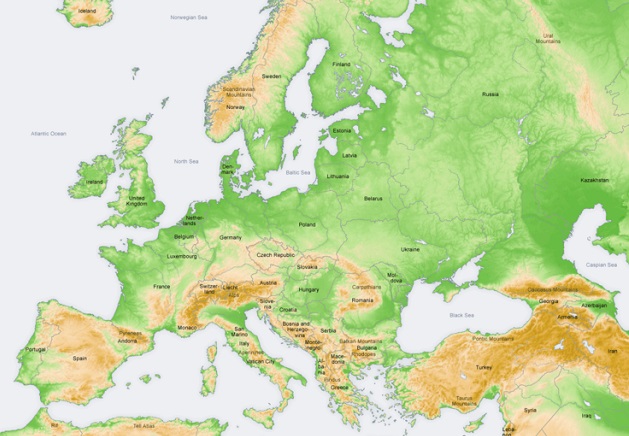Notwithstanding our departure from the EU, we are still Europeans by culture, history and geography. How might such solidarities be strengthened?
 A map of Europe. / San Jose (Wikimedia Commons 3.0)
A map of Europe. / San Jose (Wikimedia Commons 3.0)
One of the great strengths of democracy is that every adult gets to vote – and we celebrate the centenary of that right being extended to women this very year. On the other hand, one of the great weaknesses of democracy is that… every adult gets to vote!
This means that the whole nation has to accept whatever the majority votes for, even if the margin is a slender one.
With a year to go on the Brexit countdown clock, what can Christians in Britain do – whether they voted to Remain or Leave – to influence the outcome? The outcome I’m referring to isn’t whether we have a hard or soft Brexit, or what customs and tariff rules will apply, but the state of our relationships within Britain and externally as Britain leaves the EU.
In March last year we published our Cambridge Paper ‘Brexit in a fractured Europe’ by Paul Mills and Michael Schluter (who wrote The R Factor in 1993 with David Lee). It stated that reconciliation is needed around three constellations of relationships: between Leave and Remain voters in Britain, between the UK and the other 27 member states, and between the different EU27 members.
I would like to propose two concrete ways that Christians in Britain could advance this relational agenda. The first is by putting aside the tribalism of Brexiteers and Remainers. This has become the default way of arguing about Brexit: pedalling the same old narrative of blame and mistrust, assuming the moral high ground and dismissing automatically any arguments from the other side. Focusing on the complex and fraught process of extricating ourselves from 40 years of EU membership overlooks a major contributing actor for the Brexit vote in the first place. It was a protest by the ‘Left Behind’ (a term coined by Matthew Goodwin and Rob Ford) – those older, white, socially conservative voters in economically marginal areas, who felt ignored by the cosmopolitan, socially liberal graduates who held quite different views on identity, Europe and immigration. Healing the relational divide between these groupings is where reconciliation may be needed most, and this is more likely to be achieved if we resolve all to pull in the same direction in seeking the best post-Brexit trade scenarios.
This brings us to the second strategy, to re-affirm older solidarities. No matter how we voted, we have a prior and more enduring association with everyone who took part in the referendum: we are still British and, notwithstanding our departure from the EU, we are still Europeans by culture, history and geography. How might such solidarities be strengthened? One way is by building ‘communities of place’ – bringing people together who live in the same neighbourhood, yet crossing political, economic and ethnic divides. New housing developments provide especially good opportunities for this, and local churches have a strong track record in building broad community relationships as they seek to love their neighbours as themselves. This of course is the raison d’etre of the church which Jesus inaugurated, its core mission statement.
Both these ways involve a commitment to listening and face-to-face encounter – the slow and painstaking way to build trust and cultivate mutual understanding, mutual respect and shared goals and values. No matter how rocky the road to Brexit is at the national level, we can all contribute relationally to building a better post-Brexit Britain.
Jonathan Tame, Director of the Jubilee Centre (Cambridge, UK).
This article first appeared on the Jubilee Centre website and was republished with permission.

Las opiniones vertidas por nuestros colaboradores se realizan a nivel personal, pudiendo coincidir o no con la postura de la dirección de Protestante Digital.
Si quieres comentar o